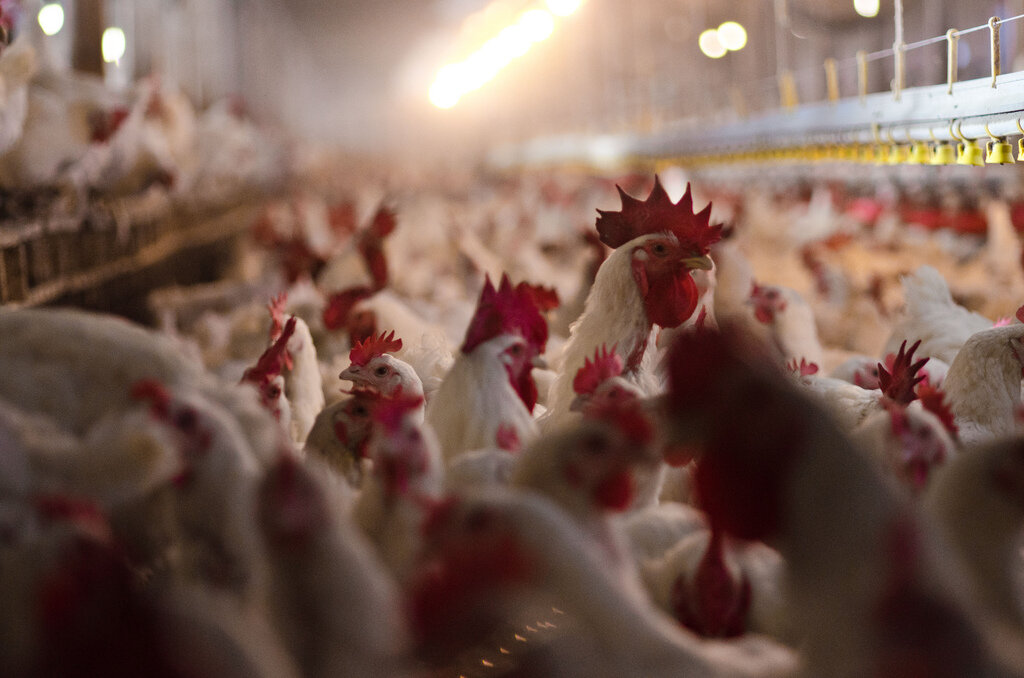In South Carolina, Poultry Industry Seeks to Eliminate Barriers to Expansion
Photo from usdagov on Flickr.
A bill in the South Carolina legislature would make it significantly harder for residents to challenge the state’s expanding poultry industry. If lawmakers pass the bill, South Carolina will be the latest in a series of states to make it harder for rural communities to resist or even carefully regulate large-scale livestock farming.
The bill, H. 3929, would alter the current permitting process for new poultry growing operations in two key ways. It removes the ability of the state’s Department of Health and Environmental Control’s to require poultry houses to build a certain distance from bodies of water and wells. It also states that only residents who live within a mile of a proposed poultry house have standing to challenge any new permit. At present, anyone living within two miles can do so.
The bill passed in the South Carolina House 77 to 12 in late June. The state Senate will take up the bill again during its next legislative session in early 2018.An earlier version of the bill would have made it even harder for residents to challenge the construction of new poultry houses by requiring anyone contesting a poultry house permit to pay a $5,000 filing fee. Michael Corley, an attorney with the South Carolina Environmental Law Project, says that even in its amended form, the bill is “really egregious legislation” that rolls back regulations that were already “lax” and “lacking.”Supporters of H. 3929 include proponents of the state’s conventional poultry industry, including the Palmetto Agribusiness Council, the South Carolina Poultry Federation, and the South Carolina Farm Bureau. The main poultry companies contracting with growers in Laurens County, the site of the industry’s current expansion, are Amick Farms and Columbia Farms. Amick Farms is owned by Illinois-based OSI Group, the 11th largest meat manufacturing company in the world.Charles Blackmon, a Laurens County resident who lives on his family’s farm, says the politics surrounding the rise of concentrated poultry growing in the region are “tearing [the] community apart.” He recently founded South Carolinians for Responsible Agricultural Practices, a group of concerned residents who challenge permits for new poultry houses in court. There are already 50 chicken houses in a 2.5-mile radius in Laurens County, and 30 more were recently approved.In 2004, the DHEC completed a water quality assessment for the Little River watershed, which encompasses Laurens County, and found that the water at each of their testing stations did not comply with South Carolina state regulations on maximum fecal coliform bacteria pollution. Some of the major sources of that type of bacteria are runoff and groundwater pollution that can be linked to livestock farming. According to data from the U.S. Department of Agriculture, there were over 1.2 million broiler chickens grown in Laurens County in 2012.Two other bills recently introduced in the South Carolina legislature also aim to make it more difficult for neighbors to challenge decisions by industrial or manufacturing facilities to expand or change their operations. Every state restricts nuisance lawsuits in some ways. But John Tynan, the executive director of Conservation Voters of South Carolina, says these new restrictions mean “the little guy” would be “shut out” of discussions around local development.Michael Corley says if the two nuisance-related bills and H. 3929 all become law, “there’s not going to be anything stopping a rural community from being overwhelmed” by industrial poultry production and its environmental effects.Big Ag groups in several other states have similarly made it harder for communities to challenge the expansion of large-scale farming. In 2012, North Dakota enshrined a broad constitutional right-to-farm protection for agricultural producers, barring any new legislation that would hinder livestock production and ranching. In 2014, Missouri passed an expanded version of the state’s right-to-farm legislation designed to shield agricultural producers from environmental regulations.
What We're Reading
A Montana District Court affirmed a lower court's ruling that mandatory collection of the state's beef checkoff tax violates the First Amendment. The court ruled that since the the Montana Beef Council, a private entity that administers the state's checkoff program, is not a governmental entity, it cannot compel ranchers to pay into the checkoff's marketing and promotion campaigns. Independent ranchers say those campaigns tend to promote large-scale, corporate agricultural production. For more background on the case, read our 2016 coverage here.
Over 800 independent breweries will begin labeling their beers as "Certified Independent Craft." The labels were created in response to several acquisitions of craft brands by multinational brewers, such as Anheuser-Busch InBev and Heineken. The Brewers Association, a group that represents the craft beer industry, defines craft breweries as those that produce fewer than 6 million barrels of beer each year, and that are less than 25% owned by a non-craft brewer.
The U.S. Seventh Circuit Court of Appeals upheld a unique, Prohibition-era law in Indiana that separates beer and liquor wholesaling. The law had been challenged by Monarch Beverage Company, a beer wholesaler in the state.

